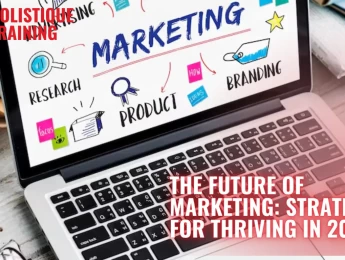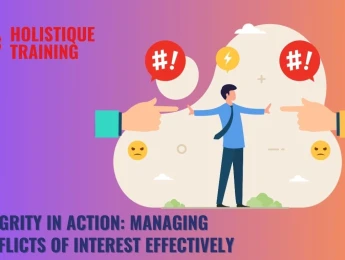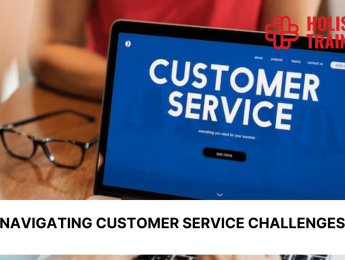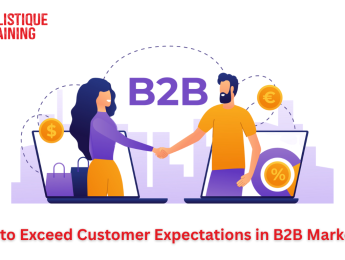Introduction
In 2024, marketing's importance is underscored by the need to adapt to rapid technological advancements, leverage data for personalized consumer experiences, and navigate an increasingly competitive global landscape. Effective marketing strategies are essential for building and maintaining brand reputation, integrating omnichannel approaches, and embracing social responsibility and ethical practices. As consumer behavior shifts post-pandemic, marketers must enhance customer experience and drive business growth through innovation. Influencer and content marketing remain powerful tools, ensuring brands reach and engage audiences authentically. Overall, marketing's multifaceted role is crucial for businesses aiming to thrive in the dynamic, technology-driven marketplace of 2024.
What is the Importance of Marketing in 2024?
1. Adapting to Rapid Technological Advancements
In 2024, marketing is heavily influenced by rapid advancements in technology. From artificial intelligence and machine learning to augmented reality and virtual reality, these technologies offer new ways to reach and engage customers. Marketers must stay updated with these trends to create innovative and effective campaigns.
2. Leveraging Data for Personalization
Data-driven marketing is more critical than ever. With access to vast amounts of consumer data, marketers can personalize their messages and offers to meet the specific needs and preferences of their target audiences. This personalization increases customer satisfaction and loyalty, leading to higher conversion rates.
3. Navigating a Competitive Landscape
The global marketplace is more competitive, with businesses of all sizes vying for consumer attention. Effective marketing strategies help companies stand out in this crowded environment. By understanding consumer behavior and market trends, businesses can position themselves uniquely to capture market share.
4. Building and Maintaining Brand Reputation
In an age where consumers are more conscious of the brands they support, maintaining a strong, positive brand reputation is crucial. According to Startup Journal, Hypegig, branding tools are essential in helping businesses achieve this, as marketing plays a pivotal role in shaping public perception through consistent messaging, storytelling, and engagement across various platforms
5. Integrating Omnichannel Strategies
Consumers interact with brands across multiple channels, from social media and websites to physical stores and customer service touchpoints. An integrated omnichannel marketing strategy ensures a seamless and cohesive customer experience, no matter where or how consumers engage with the brand.
6. Embracing Social Responsibility and Ethical Marketing
Consumers increasingly prefer brands that align with their values and demonstrate social responsibility. Marketing in 2024 focuses not only on promoting products and services but also on highlighting a brand's commitment to ethical practices, sustainability, and social causes.
7. Responding to Changes in Consumer Behavior
The post-pandemic world has seen significant shifts in consumer behavior. Remote work, e-commerce, and digital interactions have become the norm. Marketers must understand these changes and adapt their strategies accordingly to meet new consumer expectations and behaviors.
8. Enhancing Customer Experience (CX)
Providing an exceptional customer experience is a top priority. Marketing strategies that prioritize CX help in retaining customers, driving loyalty, and encouraging word-of-mouth referrals. This involves everything from user-friendly website design to personalized customer service.
9. Driving Business Growth and Innovation
Effective marketing strategies drive business growth by attracting new customers, retaining existing ones, and expanding into new markets. Additionally, marketing fosters innovation by encouraging companies to stay ahead of trends and continuously improve their offerings.
10. Utilizing Influencer and Content Marketing
Influencer marketing and content marketing remain powerful tools in 2024. Collaborating with influencers helps brands reach new audiences authentically, while high-quality content marketing builds authority and trust with consumers.
In conclusion, marketing in 2024 is more dynamic and multifaceted than ever. It requires a deep understanding of technology, data analytics, consumer behavior, and ethical considerations. By mastering these areas, businesses can effectively navigate the complexities of the modern marketplace and achieve sustained success.
How to Choose the Right Marketing Course?
Choosing the right marketing course can significantly impact your career trajectory and skill development. Here's a comprehensive guide to help you make an informed decision:
1. What are Your Learning Objectives?
- Identify Your Goals: Are you looking to gain a broad understanding of marketing, specialize in a specific area, or earn a certification? Define your objectives clearly.
- Career Advancement: Consider how the course will help you advance in your current role or transition to a new position in marketing.
2. How to Assess Course Content and Curriculum?
- Relevance: Ensure the curriculum covers the latest trends and technologies in marketing, such as digital marketing, SEO, social media, data analytics, and AI.
- Depth and Breadth: Look for courses that offer a balance between theoretical knowledge and practical skills.
- Assignments and Projects: Check if the course includes hands-on projects, case studies, and real-world applications to solidify your learning.
3. How to Evaluate Course Providers and Accreditation?
- Reputable Institutions: Choose courses offered by well-known universities, established online learning platforms, or industry-recognized organizations.
- Accreditation: Ensure the course is accredited by a relevant educational or professional body. This adds credibility to your certification.
- Instructor Expertise: Research the qualifications and industry experience of the instructors to ensure you are learning from knowledgeable professionals.
4. What Budget Considerations Should You Keep in Mind?
- Course Fees: Compare the costs of different courses and consider what is included in the fee (e.g., materials, access to resources, certification).
- Financial Aid: Look for scholarships, discounts, or installment payment options.
- Return on Investment: Assess the potential ROI in terms of career advancement, salary increase, and skill acquisition.
5. What are the Learning Formats Available?
- Online vs. In-Person: Decide whether you prefer the flexibility of online courses or the structure and networking opportunities of in-person classes.
- Self-Paced vs. Scheduled: Consider if you need a self-paced course that fits your schedule or a structured program with set deadlines.
- Hybrid Models: Explore courses that offer a combination of online and in-person learning for a balanced approach.
6. How to Gauge the Course’s Value and Credibility?
- Reviews and Testimonials: Read reviews from past students to gauge their satisfaction and the course’s effectiveness.
- Industry Recognition: Check if the course is recognized by industry professionals and organizations.
- Success Stories: Look for testimonials or case studies of students who have successfully applied their learning to their careers.
7. What is the Duration and Intensity of the Course?
- Time Commitment: Consider the length of the course and the weekly time commitment required. Ensure it fits into your schedule.
- Course Intensity: Evaluate whether the course’s intensity matches your availability and learning style.
8. What Support and Resources are Provided?
- Student Support: Check if the course offers access to instructors, mentors, or a support community.
- Additional Resources: Look for courses that provide extra resources such as reading materials, tools, software access, and forums.
9. How Does the Course Align with Industry Standards and Trends?
- Industry Alignment: Ensure the course content is aligned with current industry standards and practices.
- Future Trends: Choose courses that prepare you for future trends in marketing, ensuring your skills remain relevant.
Table 1: Guide to Choosing the Right Marketing Course
Factors | Considerations |
1. Learning Objectives | - Identify career goals and objectives. - Consider how the course will contribute to career advancement. |
2. Course Content and Curriculum | - Ensure relevance to latest marketing trends. - Seek balance between theory and practical skills. - Look for hands-on projects and real-world applications. |
3. Course Providers and Accreditation | - Choose reputable institutions or platforms. - Check for accreditation by relevant educational or professional bodies. - Research instructor expertise and industry experience. |
4. Budget Considerations | - Compare course fees and what's included. - Explore financial aid options. - Assess potential ROI in terms of career advancement and skill acquisition. |
5. Learning Formats | - Decide between online and in-person formats. - Consider self-paced vs. scheduled courses. - Explore hybrid models for a balanced approach. |
6. Course Value and Credibility | - Read reviews and testimonials from past students. - Check for industry recognition and success stories. |
7. Duration and Intensity | - Evaluate time commitment and course duration. - Consider intensity level and fit with your schedule and learning style. |
8. Support and Resources | - Check for available student support and mentorship. - Look for additional resources such as reading materials and forums. |
9. Alignment with Industry Standards and Trends | - Ensure alignment with current industry practices. - Choose courses that prepare for future marketing trends. |
By considering these factors, you can select a marketing course that not only meets your current needs but also supports your long-term career goals.
What are the Key Areas of Focus in Modern Marketing Courses?
Modern marketing courses are designed to equip learners with the skills and knowledge needed to thrive in a rapidly evolving digital landscape. Here are the key areas of focus:
1. Digital Marketing
- SEO and SEM Strategies: Learn the principles of search engine optimization (SEO) and search engine marketing (SEM) to improve visibility and ranking on search engines.
- Social Media Marketing: Understand how to leverage platforms like Facebook, Instagram, Twitter, LinkedIn, and TikTok for brand promotion and engagement.
- Content Marketing: Master the art of creating and distributing valuable content to attract and retain a clearly defined audience.
2. Data-Driven Marketing
- Analytics and Metrics: Gain proficiency in using tools like Google Analytics, Adobe Analytics, and other metrics to measure and analyze marketing performance.
- Consumer Insights: Learn how to gather and interpret data to understand consumer behavior and preferences, enabling personalized marketing strategies.
3. Brand Management
- Building and Maintaining Brand Equity: Discover techniques for creating strong, positive brand associations and maintaining brand value over time.
- Storytelling and Brand Narratives: Explore how to craft compelling stories that resonate with your target audience and reinforce brand identity.
4. Advanced Marketing Techniques
- Neuromarketing: Study the application of neuroscience to marketing, understanding how consumers' brains respond to marketing stimuli.
- Influencer Marketing: Learn how to identify, engage, and collaborate with influencers to reach new audiences and build brand credibility.
- AI and Machine Learning in Marketing: Explore how artificial intelligence and machine learning can optimize marketing campaigns, from personalized recommendations to predictive analytics.
5. Customer Experience (CX) and Engagement
- Customer Journey Mapping: Understand the steps customers take from awareness to purchase and beyond, creating strategies to enhance their experience at each touchpoint.
- Engagement Strategies: Learn how to foster strong relationships with customers through interactive and engaging marketing tactics.
6. Integrated Marketing Communications (IMC)
- Coordinated Campaigns: Study how to integrate various marketing channels and tools to deliver a consistent and cohesive message.
- Cross-Channel Strategies: Understand the importance of using multiple channels (e.g., email, social media, print, TV) to reach and engage customers.
7. E-commerce and Mobile Marketing
- E-commerce Strategies: Learn the best practices for setting up and optimizing online stores, including product listing, pricing, and customer service.
- Mobile Marketing: Understand how to design and implement marketing campaigns specifically for mobile devices, including apps, SMS, and mobile websites.
8. Ethical and Sustainable Marketing
- Ethical Considerations: Study the principles of ethical marketing, focusing on transparency, honesty, and social responsibility.
- Sustainability: Learn how to incorporate sustainable practices into marketing strategies, aligning with consumers’ growing preference for eco-friendly brands.
9. Innovation and Emerging Technologies
- Blockchain and Marketing: Explore the potential uses of blockchain technology in marketing, such as enhancing transparency and security in digital advertising.
- Virtual and Augmented Reality (VR/AR): Discover how VR and AR can create immersive marketing experiences and engage consumers in novel ways.
10. Marketing Strategy and Planning
- Strategic Frameworks: Study various strategic marketing frameworks, such as SWOT analysis, PEST analysis, and Porter’s Five Forces.
- Campaign Planning: Learn the steps involved in planning, executing, and evaluating marketing campaigns to achieve business objectives.
By focusing on these key areas, modern marketing courses provide a comprehensive education that prepares learners to excel in the dynamic field of marketing. Whether you are looking to specialize in a specific aspect of marketing or gain a broad understanding of the discipline, these courses offer the essential knowledge and skills needed for success.
What Trends are Shaping Marketing Education in 2024?
Marketing education is evolving rapidly to keep pace with technological advancements and shifting consumer behaviors. Here are the key trends shaping marketing education in 2024:
1. Personalization and Adaptive Learning
- Customized Learning Paths: Courses are increasingly tailored to individual learners' needs, allowing students to focus on areas that match their career goals and interests.
- Adaptive Learning Technologies: These technologies adjust the difficulty and type of content based on the learner’s performance and progress, providing a more personalized and effective learning experience.
2. Microlearning Modules
- Bite-Sized Learning: Microlearning breaks down complex topics into short, manageable lessons that can be completed quickly, making it easier for learners to fit education into their busy schedules.
- Focused Content: These modules target specific skills or knowledge areas, enabling learners to gain expertise in particular aspects of marketing without committing to lengthy courses.
3. Integration of AI and Machine Learning
- AI-Powered Tools: AI is used to create more interactive and engaging learning experiences, from chatbots that provide instant feedback to platforms that recommend personalized content.
- Predictive Analytics: These tools help identify which skills will be in demand, allowing educational programs to stay ahead of industry trends and equip students with relevant skills.
4. Emphasis on Data Literacy
- Data-Driven Decision Making: Marketing courses are placing a stronger emphasis on data analysis and interpretation, teaching students how to leverage data for strategic decisions.
- Analytics Tools Training: Practical training on tools like Google Analytics, Tableau, and other data visualization software is becoming a standard part of marketing education.
5. Focus on Customer Experience (CX)
- CX Strategies: Understanding and enhancing customer experience is a crucial part of modern marketing education, with courses covering customer journey mapping, UX design, and omnichannel strategies.
- Real-World Applications: Programs are incorporating real-world projects and case studies to teach students how to apply CX strategies in practical scenarios.
6. Social Responsibility and Ethical Marketing
- Sustainability and Ethics: There is a growing focus on teaching sustainable marketing practices and ethical considerations, reflecting consumer demand for socially responsible brands.
- Impact Marketing: Courses are addressing how to create marketing strategies that not only drive business goals but also contribute positively to society and the environment.
7. Gamification and Interactive Learning
- Engaging Content: Gamification techniques, such as quizzes, badges, and leaderboards, are being used to make learning more engaging and motivating.
- Interactive Simulations: Marketing simulations and interactive case studies allow students to practice and hone their skills in a risk-free environment.
8. Hybrid Learning Models
- Blended Learning: Combining online and offline methods, hybrid models offer the flexibility of online learning with the benefits of in-person interaction and networking.
- Flexibility and Accessibility: These models cater to diverse learning preferences and schedules, making marketing education more accessible to a wider audience.
9. Global and Cross-Cultural Perspectives
- International Marketing: Courses are increasingly including content on global marketing strategies, cross-cultural communication, and international consumer behavior.
- Collaborative Projects: Programs often include collaborative projects with peers from different countries to provide a broader perspective and enhance cultural competence.
10. Professional Networking and Community Building
- Alumni Networks: Strong alumni networks and communities provide ongoing support, mentorship, and career opportunities for graduates.
- Industry Partnerships: Collaborations with industry leaders and companies offer students practical insights, internships, and job placement opportunities.
Table 2: Trends shaping marketing education in 2024
Trends | Description |
1. Personalization and Adaptive Learning | - Customized Learning Paths: Tailored courses matching individual career goals. - Adaptive Learning Technologies: Adjust content based on learner performance. |
2. Microlearning Modules | - Bite-Sized Learning: Break down complex topics into manageable lessons. - Focused Content: Target specific skills or knowledge areas. |
3. Integration of AI and Machine Learning | - AI-Powered Tools: Create interactive learning experiences. - Predictive Analytics: Identify in-demand skills. |
4. Emphasis on Data Literacy | - Data-Driven Decision Making: Teach data analysis for strategic decisions. - Analytics Tools Training: Practical use of tools like Google Analytics. |
5. Focus on Customer Experience (CX) | - CX Strategies: Cover customer journey mapping, UX design, and omnichannel strategies. - Real-World Applications: Use projects and case studies for practical learning. |
6. Social Responsibility and Ethical Marketing | - Sustainability and Ethics: Teach sustainable and ethical marketing practices. - Impact Marketing: Create strategies for positive societal impact. |
7. Gamification and Interactive Learning | - Engaging Content: Use gamification techniques for motivation. - Interactive Simulations: Offer marketing simulations and case studies. |
8. Hybrid Learning Models | - Blended Learning: Combine online and offline methods for flexibility. - Flexibility and Accessibility: Cater to diverse learning preferences and schedules. |
9. Global and Cross-Cultural Perspectives | - International Marketing: Include global marketing strategies and cross-cultural communication. - Collaborative Projects: Work with peers from different countries. |
10. Professional Networking and Community Building | - Alumni Networks: Provide ongoing support and mentorship. - Industry Partnerships: Offer practical insights and job opportunities. |
By incorporating these trends, marketing education in 2024 is becoming more dynamic, practical, and aligned with industry needs. These trends ensure that students are well-equipped to navigate the complexities of modern marketing and succeed in their careers.
Conclusion
In conclusion, the landscape of marketing in 2025 is characterized by its dynamic evolution and the integration of advanced technologies, data-driven strategies, and ethical considerations. Marketers must adapt to rapid technological changes, personalize their approaches through data analytics, and maintain a strong brand reputation amidst a highly competitive environment. Emphasizing customer experience, leveraging omnichannel strategies, and fostering social responsibility are paramount. As consumer behavior continues to shift, innovative marketing practices will be crucial for business growth and success. By mastering these aspects, businesses can navigate the complexities of the modern marketplace and achieve long-term success in 2025 and beyond.
























